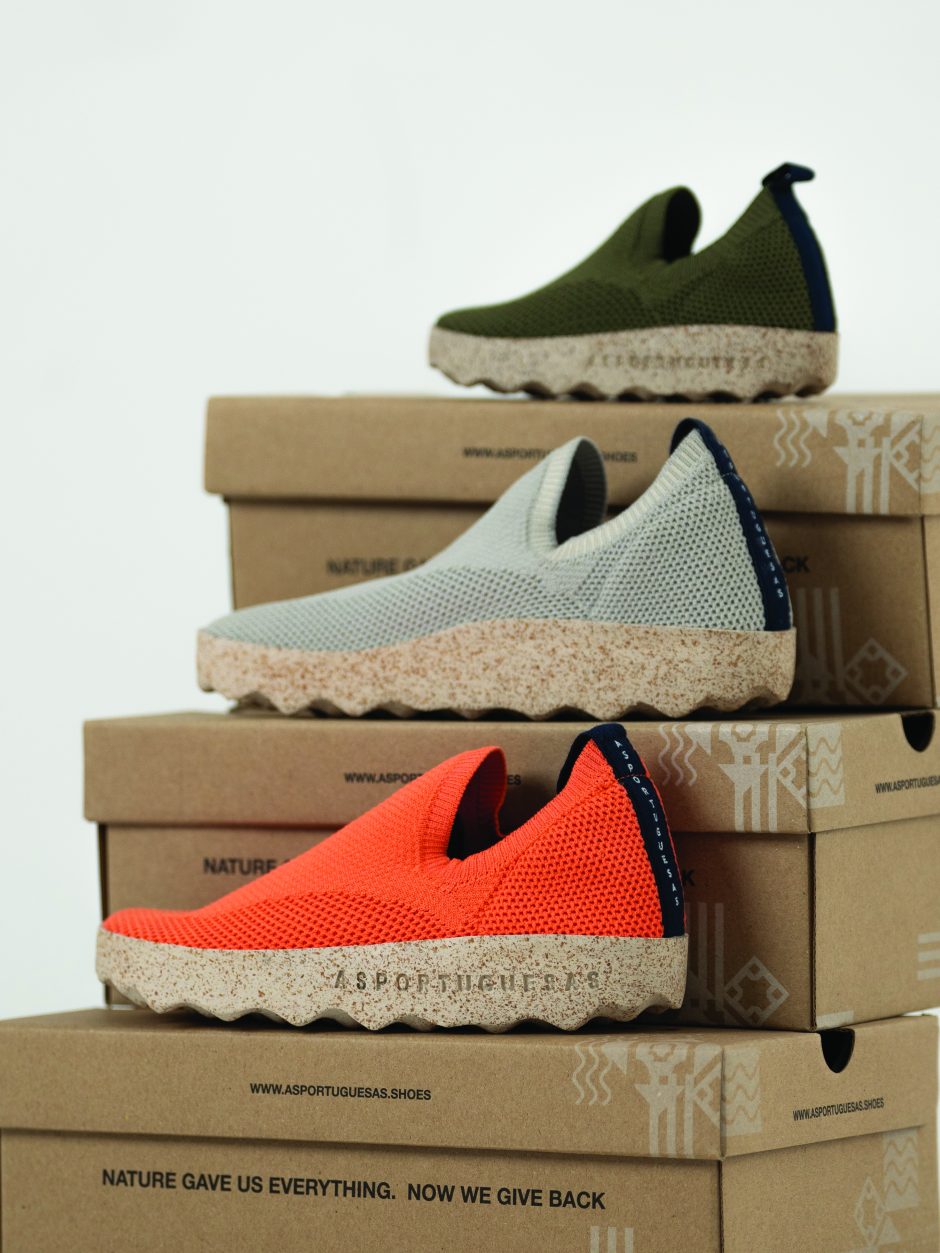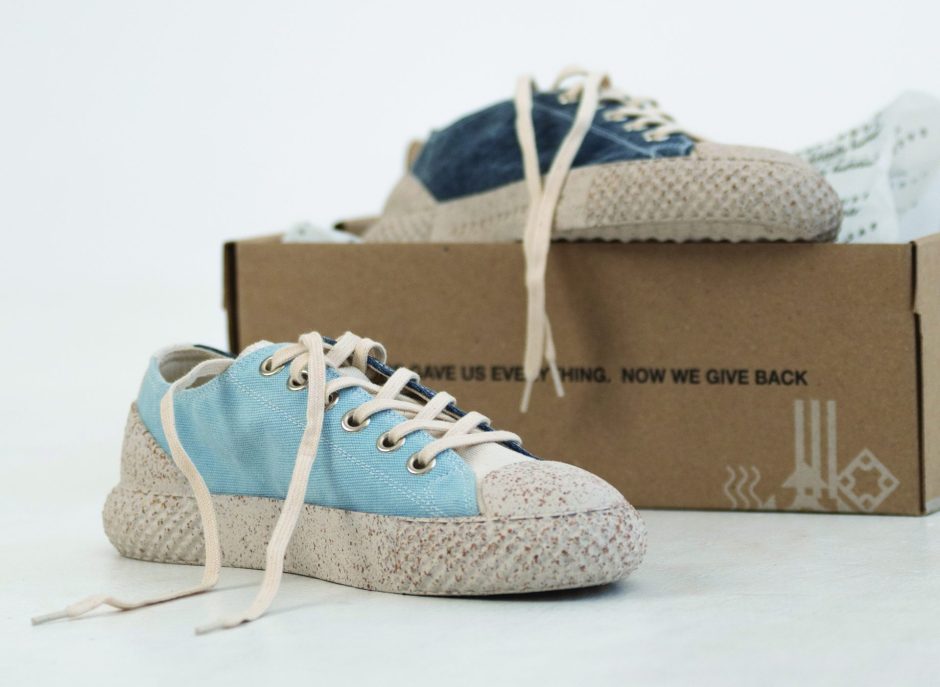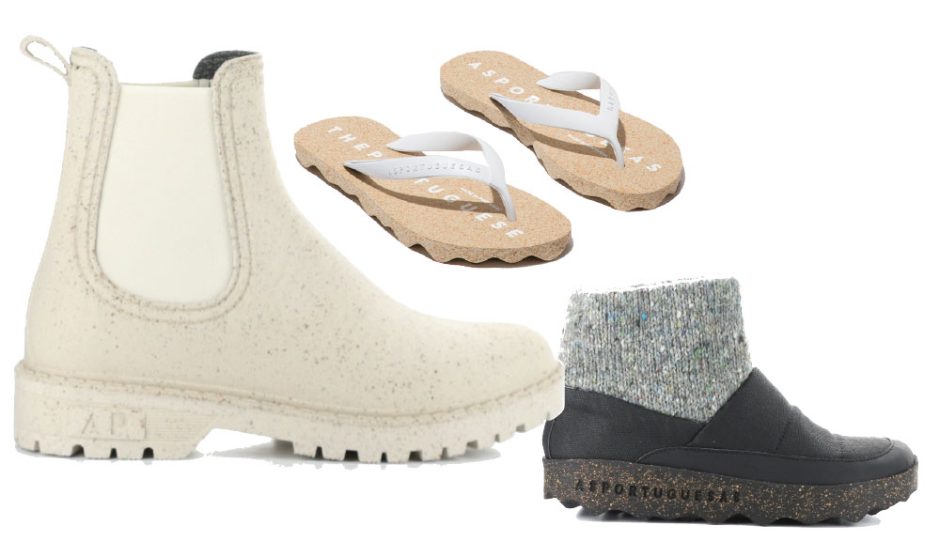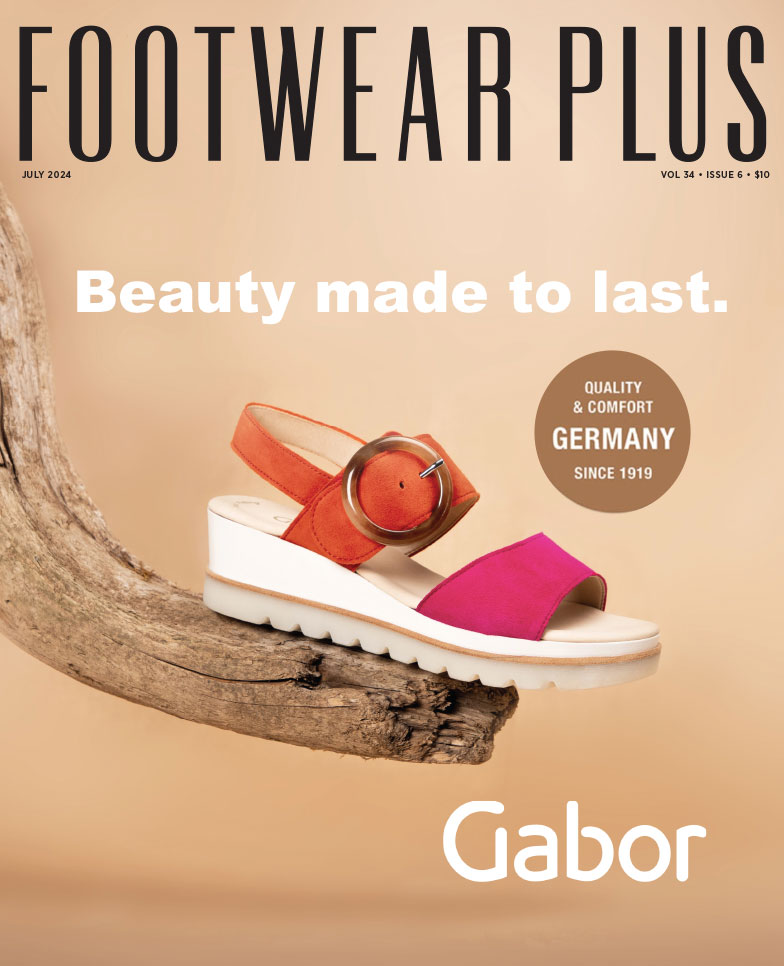
Asportuguesas started with a cork-based flip-flop in early 2016. To be precise, the Portuguese brand’s origins date back a few months prior, at the drawing table of avid surfer Pedro Abrantes, then a recent architect graduate, and now the brand’s Chief Director. His Base flip-flop design won an annual contest run by Amorim, the world’s largest cork producer, seeking innovative ideas that used the natural, recyclable, and renewable material.
While minimal in design, that flip-flop held big potential. Not only would its cork/latex soles be fully sustainable, they’d be lightweight, comfortable, flexible, and water-friendly. Add Abrantes’ eye-catching wavy sole design, and this combination of unique attributes had potential appeal to a worldwide audience spanning all ages and demographics. After all, flip-flops are a universal footwear language—most everyone has at least one pair. Abrantes fittingly named his brand Asportuguesas, which translates to “the Portuguese.” Hello, world.
But Abrantes’ prototype held much greater potential. His unique design had the DNA to evolve into a potentially much bigger, broader, sustainable-based, lifestyle fashion brand—and that is exactly what is happening at Asportuguesas. Back then, the stars were just beginning to align. Abrantes might not have envisioned this trajectory when he submitted that first design, but it’s clear to him now. “We make shoes that make our customers feel good about themselves when wearing them,” he says. “Not just because of the looks and comfort, but because they also have a lower impact on our planet.”
That clever flip-flop design quickly caught the attention of Kyaia, one of Portugal’s largest footwear manufacturers and makers of Fly London. In 2017, the company partnered with Amorim Cork Ventures to provide the necessary footwear expertise to take Asportuguesas global and expand the collection into a broader range of styles. That’s when Kevin Bosco, president of Bos. & Co., long-time North American distributors of Fly London, entered the picture. He too saw potential, and his interest grew exponentially when he caught his first glimpse of the closed-toe styles “City” and “Come,” which were in the pipeline.
“The cork flip-flops were an interesting idea about responsible sourcing, but what really piqued our interest was when Kyaia’s design team and Pedro came out with the next step—these boiled wool uppers on a wavy, thicker cork bottom with an offset toe last,” Bosco says. “That really caught our eye.”
In early 2018, Bos. & Co., makers of a namesake label and distributors of Softinos and Ambitious, signed on to introduce Asportuguesas to North America. The flip-flops made their debut that spring, followed by the closed-toe styles in the fall. Bosco’s product instincts were spot-on. The flip-flops received a nice reaction within a limited distribution, which might have also marked an industry first: a Canada-based company introducing a new flip-flop brand. Then the closed-toe styles popped at retail. “That’s when Asportuguesas caught on fire,” he says. “People loved the toe shape, the sustainability story, the colors, and the thick cork sole.” Over the next three months, the brand got a great deal of traction, and distribution across the United States spread. “Certainly, the Northeast and the Pacific Northwest, where many eco-conscious consumers reside, embraced the brand,” Bosco says. “With the initial sales and the turnover, we knew we had a tiger by the tail.”
Then fate, in the form of a pandemic, stepped in to fuel Asportuguesas’ growth. The seemingly overnight onset of remote workplaces and social distancing fueled a slipper craze. Sales of the brand’s closed-toe styles skyrocketed. “Despite our efforts to tell people that these are street-friendly shoes, they became de facto house slippers for many,” Bosco explains. “The comfort and coziness of those styles, not to mention their appealing sustainability angle, played well into that whole consumer mentality.” It’s a mentality, he adds, that is only getting stronger post-pandemic. “In 2019, our Asportuguesas customer was a very eco-conscious, granola type, but that has since expanded to include a much more everyday person,” he says, citing the overall shift to more casual dressing as a factor. “But we’re also gaining traction when we talk about sustainability. It means a lot more to many more consumers than it did five or 10 years ago.”
Secret Sauce

Sustainability, comfort, and the right shoe at the right time have been key factors fueling Asportuguesas’ growth to date. But there are other, perhaps less tangible, ingredients involved, too. Much has to do with the brand’s utilitarian chic aesthetic, a.k.a. the sweet spot between function and fashion. Or, and this is a compliment, Americans love “ugly comfort” shoes. Think Ugg, Crocs, Vibram FiveFingers, Hoka, Keen, Hunter, and Birkenstock, to cite just a few examples. First, they are conversation starters. Second, they’re (usually) designed to improve wearers’ lives, providing protection from the elements or injury prevention, pain relief, and improved performance. Consumers want technology to offer solutions. And the sustainable design angle is a bonus, as growing numbers of consumers look for purchases that help to save the planet.
Asportuguesas is exactly what John Daher, owner of The Shoe Box in Kennebunkport, ME, was on the hunt for when he opened his doors two years ago. The long-time former product development director for Clarks North America and later Drydock Footwear had gone back to his retailing roots with the mission of making shoe shopping interesting and fun again. He focused primarily on European comfort brands with unique styling and interesting back stories to tell customers. Think more art gallery than stack ’em and sell ’em. Asportuguesas fits to a T.
“Asportuguesas checks all the boxes in our mission,” Daher says, noting that the brand has been in the store’s assortment from day one. “It’s been one of our best sellers year-round, and the brand has become a local favorite. It can be seen worn in coffee shops and to and from fitness classes all over town.”
Daher cites Asportuguesas’ quirky styling, fun colors, and textures as being the perfect complement/alternative to other, more mainstream brands that are currently trending, i.e. Birkenstock and Onfoot. “I believe the wool uppers provide more functional attributes than leathers and so-called vegan materials,” he says, noting that the eco-friendly aspects of cork and boiled wool are a key selling feature. “However, the product needs to deliver on styling, comfort, and price, as eco-friendly cannot be the only selling point,” Daher adds. “Asportuguesas delivers on all of those aspects. The brand is at the forefront—and is a great blueprint—for the future of sustainable footwear.”
Kamilah Muhammad, store manager at Street Feet in Santa Fe, NM, says the team was initially attracted to Asportuguesas’ quirky styling. Then wear-testing sealed the deal. “We fell in love with the comfort; we’ve dubbed them the ‘sweatpants of shoes,’ and every staff member owns at least one pair,” she reports, adding, “Asportuguesas is one of those shoes that you reach for every day.”
Similar to The Shoe Box, Street Feet is on the hunt for unique merchandise with a focus on comfort lifestyle. That includes Arcopedico, Cydwoq, On, Naot, and Rieker, among others. The store brought Asportuguesas into that mix in the fall of 2019. “From the start, they were a hit in our store,” Muhammad reports. “The City wool clog is our number-one seller but, over the years, we’ve carried a variety of their styles (includes the Cana and Coly sandals), and have done well with all of them.” As for the Asportuguesas customer, she says the brand mirrors Street Feet’s diverse customer base. “Most of our customers are at least curious about the brand, and we’ve sold them to almost every type of person imaginable,” she says, adding that sustainability is a key selling point. “That’s definitely a huge bonus to our customers, and we love supporting brands that are socially and/or environmentally conscious.”
Green for Good

Unlike a lot of brands that may be dabbling in sustainability because it’s fashionable or, worse, others that are making false claims, Asportuguesas is all-in and transparent on its eco-friendly agenda. That isn’t going to change; sustainability is the heart of Asportuguesas.
“Asportuguesas has been 100 percent sustainable right from the start,” Abrantes affirms. “Cork is the DNA of our brand, but our mission is to inspire people to live a more fulfilled and conscious life with every step. We’re determined to leave a mark—from the choice of materials to the way we produce and communicate our products—by using the least amount of natural resources and maintaining our carbon footprint as low as possible.”
Being green isn’t easy, nor is it getting easier, according to Abrantes. “Despite the offer of eco-friendly raw materials increasing in the market, brands have to be very careful and analyze the impact of the production of these materials,” he explains. “How are they made, where are they made, what are they really made from, etc.? All of this has an impact on our planet.” In addition, he says quality and durability are top concerns. “Our goal is to produce quality, eco-friendly footwear that lasts, because people have to realize that, now more than ever, they have to buy less and buy better.”
Asportuguesas’ efforts are not made any easier amid all the greenwashing. That only confuses consumers and could turn many off to sustainable designs all together. For example, Abrantes cites brands that are launching one product in their line with some sort of sustainable material, or including an element of sustainable packaging. It’s often more a gimmick than a meaningful impact. “While it’s good that some brands are realizing the need to become more eco-friendly, many of them do this just to catch the public’s attention,” he says. Abrantes believes consumers, overall, are slowly paying more attention to sustainable design, especially younger generations. However, he says there is still a lot of work to be done.
In the meantime, Bosco gives major props to Asportuguesas’ commitment to sustainability, which is not easy to do or communicate. “You’ve got to use water-based cements and find sustainable materials that actually perform, and you have to back check all of your sourcing,” he says. That’s a lot of additional work, and with all the greenwashing going on that involves skipping many of those steps, it only makes it more difficult to inform consumers that we’re on the up and up.” Asportuguesas, Bosco adds, is fighting the good fight, and it won’t give up. “Every aspect of Asportuguesas features a sustainability component. That is our mantra, and we’re sticking to it. It’s not just one shoe, or one component in a shoe; it’s the entire brand philosophy, and it’s important to tell that story.”
Next Chapters

The push now is to make Asportuguesas more of an outdoor brand. That includes this fall’s launch of the Oak, its first rain boot and made entirely of its proprietary cork/latex compound. “It’s an innovative project where we fully inject the material of our outsoles in one single piece,” Abrantes explains. “There are many options on the market, but all are made from PVC. This is the first sustainable rain boot.”
Bosco says the Oak joins a roster of outdoor-suitable styles that includes the Fluff boots collection made of recycled nylon uppers and the Cora knee-high boot made of boiled wool. In addition, there are casual sneakers featuring cork soles and cotton uppers, a boat shoe-meets-Wallabee wool lace-up, and a slew of eco-friendly slip-ons and sandals. “Taking the product out of the home is our main goal now, and where we see the brand heading,” Bosco says. “Certainly, it’ll take some time to do that over the next two to three years. We’re just getting started, having just introduced new boots for fall.”
Like the new Close boot. It features a combined upper of boiled wool and water-resistant nylon made from 70 percent recycled cotton obtained from treated and reoperated textile remains. The remaining 30 percent is made of Ecovero, a special spin-dyeing process material in which color pigments are directly incorporated in the fibers. This can eliminate the need for additional downstream dyeing steps, resulting in up to 50 percent less energy and water consumption, while achieving up to a 60 percent reduction in carbon footprint compared to conventional dyeing. Additionally, the Lenzing-made Ecovero’s viscose dyeing process comes from certified renewable sources of wood. “This material goes hand-in-hand with our overall sustainability story,” Bosco says, adding, “The quality and performance of the materials are the same, if not better, than non-sustainable alternatives.”
Bosco is confident Asportuguesas’ has all the necessary brand ingredients to continue to flourish indoors and out. It starts with that proprietary cork/latex outsole blend, which is more flexible than cork soles. “There’s no break-in period with our soles,” he says. “You can walk to your heart’s content right out of the box.” Asportuguesas is also more affordable compared to the leading cork-soled brand on the marketplace. “We’re miles below Birkenstock in price. Our City and Come close-toe styles, for example, are in the same league as Halfinger,” Bosco says. Last but not all, he cites Asportuguesas’ underground status—a fresher alternative to mainstream Euro comfort brands. “We’re younger, hipper, thicker, greener…we’ve got that quirky, funky, sustainable vibe going for us,” he notes. “It’s a great story to tell.”
Street Feet’s Muhammad believes Asportuguesas is just scratching the surface of its potential. “From the beginning, we’ve expanded the line year-over-year,” she says. “As long as they continue to update styles, colors, and sustainable materials, we think there’s strong growth potential going forward.”
Abrantes, for one, believes Asportuguesas holds huge growth potential in North America and beyond. And while he says the product speaks for itself, an investment in communicating the brand’s unique value proposition is needed. That story centers on cork. “We need to explain more efficiently the story behind this rich and noble raw material,” he says. Like, for example, how cork is a 100-percent plant tissue, a single cubic centimeter contains almost 40 million cells, and it takes each cork oak tree 25 years before it can be stripped for the first time. And how cork oak forests protect against erosion and desertification, and play an important role in the regulation of the hydrological cycle. And how cork bark is locally and manually extracted every nine years without harming the tree. And how these trees have an incredible capacity to absorb carbon dioxide from the atmosphere. (One ton of cork absorbs 72 tons of carbon dioxide.)
“When we properly explain the unique characteristics of cork and all the sustainable processes behind the making of our shoes, the consumer immediately understands the value of Asportuguesas,” Abrantes says, adding, “Our unique designs may catch the attention of consumers, but it’s when they hear this incredible story that they fall in love with our product.”
Of course, that brand recipe is not complete without the comfort and quirkiness that has brought Asportuguesas to the dance. Abrantes, the head chef, isn’t changing those key ingredients. “We want people to look at our shoes and identify straight away that’s Asportuguesas,” he says. “And we’ll keep creating innovative designs and carrying on efforts to include mix in new sustainable materials and best practices.” Abrantes adds, “At the end of the day, our shoes have to look good, and consumers have to feel good wearing them.”



